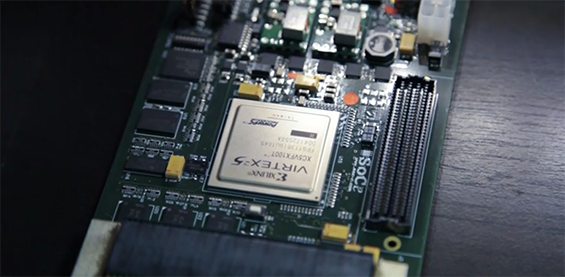LifeSeeker is a air-transported telephone base station, capable of providing coverage over the area the helicopter moves as it travels. Its most notable application is to find lost mountaineers that have a mobile, irrespective of whether they have coverage. LifeSeeker relays coverage and geolocates the terminal, making it easier to find the victim and even establish a communication channel.
LifeSeeker is a product from the engineering company, Centum, developed in conjunction with the Basque company, System-on-Chip engineering, with the assistance of several professors and researchers from UPV/EHU.
System-on-Chip engineering(SoC-e) is a spin-off from UPV/EHU, created by professors from the Department of Electronic Technology. Their work involves the design and development of critical communications systems. Their electronic products are aimed at resolving challenges in cutting edge sectors such as energy, advanced manufacturing (also called “Industry 4.0”), and aerospace. They have already been working on different projects for 5 years, their technology is used in 14 countries, and the company currently employs 10 full time professionals.
They base their products on the electronic technology of programmable devices (FPGA), which can be programmed to carry out very different tasks. For example, SoC-e can be used in areas such as energy and smart networks to design electronic products that enable the real time sending of electric plant operations data.

Each project is different, and as such, requires very specialised knowledge. Their close collaboration with the UPV/EHU enables them to find the experts each project requires from the different departments and to establish collaboration contracts with them through knowledge transfer offices. Given the increasingly shorter development times for electronic products, the concept of the extended company is particularly important, involving collaborations with other companies, technological centres, and the university, depending on the specific needs of each project.
The professors taking part in those projects also benefit from the collaboration. On the one hand, they put their particular expert knowledge into practice. On the other, it is a way of coming into contact with the latest technology available on the market and keeping lines of research open over time. In the words of Armando Astarloa, founding partner of SoC-e and professor from the UPV/EHU Electronic Technology Department, “collaboration with a technology based company helps you to strengthen your lines of research over the medium and long term”.
Armando also considers these collaborations enable them “to enrich their teaching with practical cases of interest for the student”, as well as “provide knowledge on the technologies that will be launched when these students enter the workforce”. He also considers there is a certain level of satisfaction on seeing “a company both growing and adding staff that were educated in the UPV/EHU, who go on to be involved in cutting edge technological and international projects”.
Do you need an expert? Contact us
What is the benefit of contracting projects with companies?
¿Cómo puedo contratar proyectos con la Universidad?
Euskoiker has more than 30 years of experience managing all kinds of projects